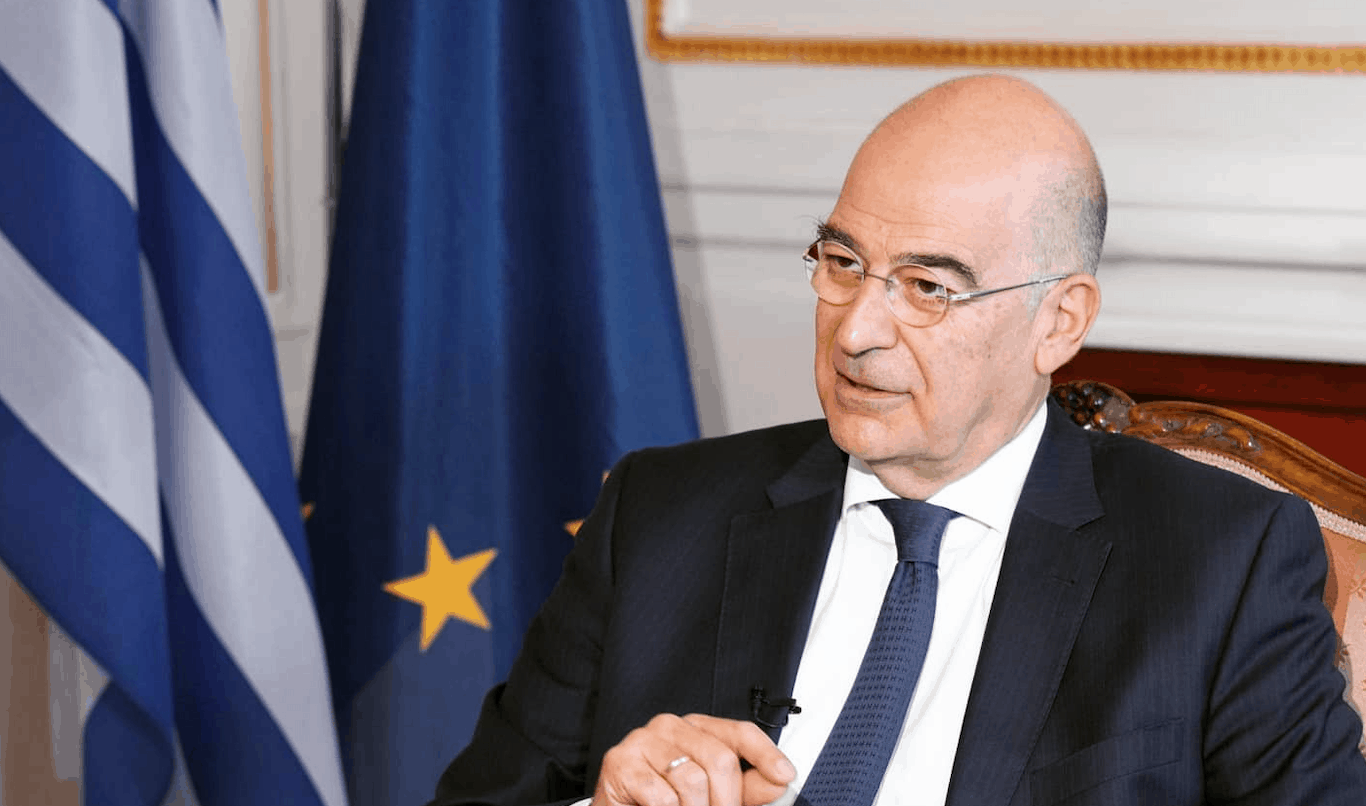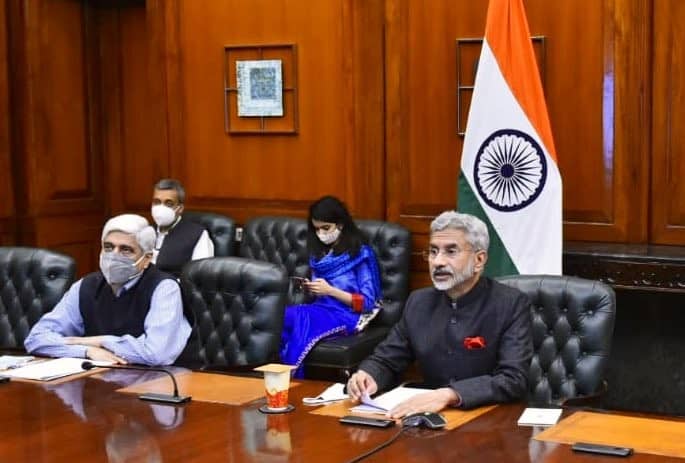Foreign Minister Nikos Dendias commented in an interview with Ta Nea about a variety of issues, including exploratory contacts between Greece and Turkey.
Dendias also spoke about new US President Joe Biden and what this could mean for Greece.
Finally, he discussed Greece's relations with the Arab World, Russia and India.
The interview Dendias had with Ta Nea:
What are the first messages from the start of the exploratory talks? Is de-escalation achieved?
Allow me to start with a clarification, which is of particular importance. This is not a starting of exploratory talks, but a restart.
The 61st round took place last Monday. It is a fact that these contacts had been suspended for almost five years.
In this meeting we caught the thread from where we had left it.

From the very beginning, Greece set as a criterion for these contacts a long-term de-escalation and the end of provocative actions.
There were, of course, isolated incidents. But, in general, a relative calm "on the ground" prevailed, which allowed us to accept the invitation from the Turkish side initially and then agree to hold a new round of talks in Athens in the near future.
But let me remind you that de-escalation should be permanent. This point is also contained in the Conclusions of the European Council last December.
Are the end of exploratory contacts on the horizon?
We must clarify that the contacts are not negotiations and do not have a specific expiration date.
The question is whether convergence points will be found for possible negotiations on the delimitation of the Exclusive Economic Zone and the Continental Shelf in the Aegean and the Eastern Mediterranean on the basis of International Law.

These contacts started 19 years ago. It is, therefore, difficult to talk about their ending in a specific timeframe.
However, I would like to point out that Greece today, through specific actions by the Mitsotakis government, is diplomatically and defensively shielded and has no reason to fear a dialogue based on international law.
We approach them with confidence, as everyone knows that we can defend our national interests.
Have we moved beyond a list of sanctions?
The conclusions of the December European Council are clear.
High Representative [Josep] Borrell, together with the EU, will present a report on Euro-Turkish relations, which will include proposals, with a negative or even a positive sign, depending on Turkey's behavior.
It should be made clear, however, and I repeat, that the possibility of imposing new sanctions against Turkey does not have an exclusive timeline for the March European Council.
In other words, it is not enough for Turkey to show good "conduct" and for things to remain as they are.
New restrictive measures should continue to exist as a possibility.
Our aim is not to punish Turkey.
What we want is for Turkey to behave as a modern state that respects the rules of peaceful coexistence between neighboring states, as well as international law.
As long as Turkey refrains from new challenges and meets certain fundamental criteria set for all candidate countries wishing to join the European Union, Greece will have every reason to continue its support for its European perspective.
Ultimately, it is up to Turkey to seize the opportunity given to it and bring the issue of its European course back to the forefront.
We also do not forget that a large part of Turkish society is always looking forward to Europe.
We must encourage this part.
You stated that after the Ionian Sea, what will follow is the expansion of territorial waters south and east of Crete. When are the next steps planned and what is your response to the statements by the Turkish Foreign Minister on the Aegean?
Being a lawyer, I am always very careful with formalities.
It is one thing to talk about areas east of Crete and another the eastern part of Crete, to which I said in Parliament.
In any case, what we have repeatedly stressed, both Prime Minister Kyriakos Mitsotakis and myself, is that Greece has the inalienable right to extend its territorial waters, anywhere in our territory and whenever it is deemed appropriate.
Of course, in order for any extension to take place, the relevant technical elaboration must have preceded, such as the study of drawing straight lines and closing the bays, and the issuance of the relevant Presidential Decrees.
Regarding the repetition of a casus belli [cause for war] by the Turkish side, I have two remarks.
First of all, my Turkish counterpart reiterated the firm positions of his country, which have been repeated for 25 years. They do not surprise me.
But I want to emphasize that it is not acceptable, in the 21st century, for Turkey to continue to think and express itself with the logic of gun-wielding violations of fundamental rules in international conduct, as defined by the UN Charter.
I raise this issue, which some European capitals seem to want to overlook, in all my contacts.
For example, at the beginning of last week in Brussels with European officials and the Secretary General of NATO.
It's not something that pleases me, it is the opposite. But I have an obligation to do this.
Besides, it concerns the exercise of the right of Greece, which is part of the European acquis.
A new presidency in the US - are you waiting for a review of their policy? How will this affect relations with Turkey, but also Washington's policy in the Eastern Mediterranean, given that the US wants to keep Ankara in the West?
It is too early to make safe predictions about how the new US administration will move in terms of relations with Turkey.
On the one hand, as you rightly observed, the US wants to keep Turkey tied to the West, mainly through NATO.
This has been the policy of the Obama administration, many of whose officials have now returned to key positions, particularly in the State Department.
But there is an important aspect: Turkey has changed significantly in recent years.
The same goes for US-Turkish relations.
Let me remind you that, according to recent polls in Turkey, the US is considered by Turkish public opinion to be the biggest threat to the country.
The first samples of the new US government show that no blank cheque will be given.
I am referring to the statement made by the new US Secretary of State that if necessary, other sanctions will be imposed on the S-400.
At the same time, we support the rather harsh statement by US Secretary of State on the human rights situation. No one has delusions.
Even today's Turkey is a particularly difficult, but at the same time an important ally for the US.
Cooperative initiatives from India to the Arab world. What are the next moves on the agenda?
Our relations with the Arab countries, but also with Israel, have, as you know, developed particularly in recent months.
I look forward to the signing of the Common Foreign and Security Policy Cooperation Agreement with the United Arab Emirates, as well as the forthcoming signing of a defense cooperation agreement with Saudi Arabia.
Next week I will visit Israel again.
The next day we are planning an enlarged meeting of Foreign Ministers with the participation of Cyprus, as well as Middle Eastern countries (Egypt, United Arab Emirates, Saudi Arabia).
You also mentioned India.
Unfortunately, I believe that we have neglected our relations with this country for decades.
India is the largest democracy in the world.
It is the country with the most Muslim citizens after Indonesia.
It is also a rising political and economic force, but also a non-permanent member of the Security Council.
Given the political geography of the region and the influence of Turkey in some countries, it is a fact that on many issues of international interest, our positions are identical with those of India.
Unfortunately, the last meeting of the Foreign Ministers of the two countries took place in 2003.
Last October I had a video conference with my Indian counterpart and we agreed to meet as soon as possible and when health conditions allow it, either in Athens or New Delhi.

Greece is committed to developing relations with its traditional partners and allies.
But this does not mean that we should not open our horizons and look for new partners.
Of course, our relations with Russia are also important for us, a great power with traditional ties with Greece.
The Russian Deputy Foreign Minister Mr. Grusko visited Greece days ago, following the visit of the Foreign Minister Mr. Lavrov a few months ago.


